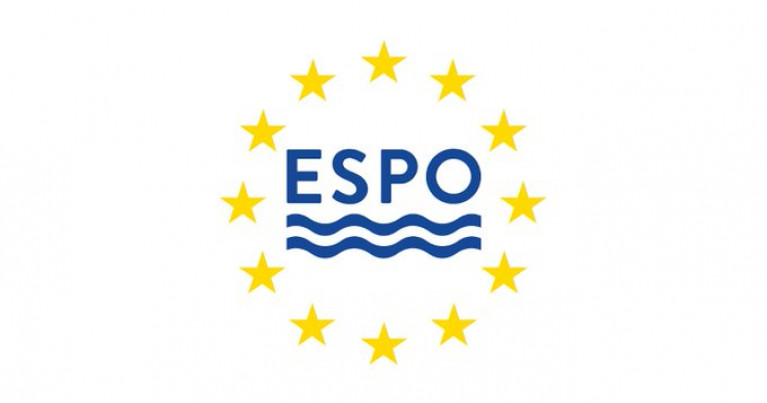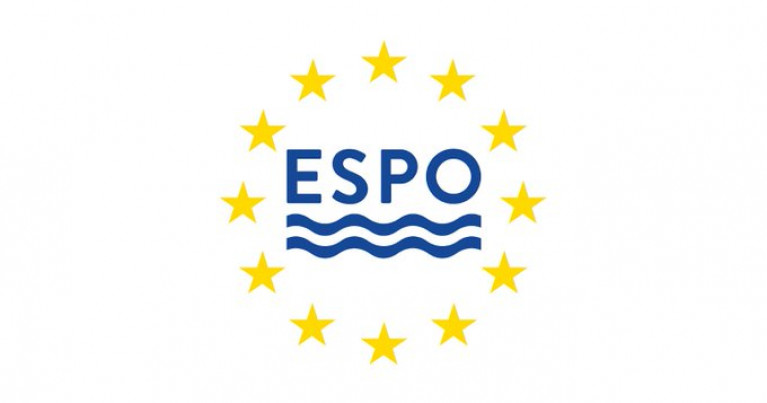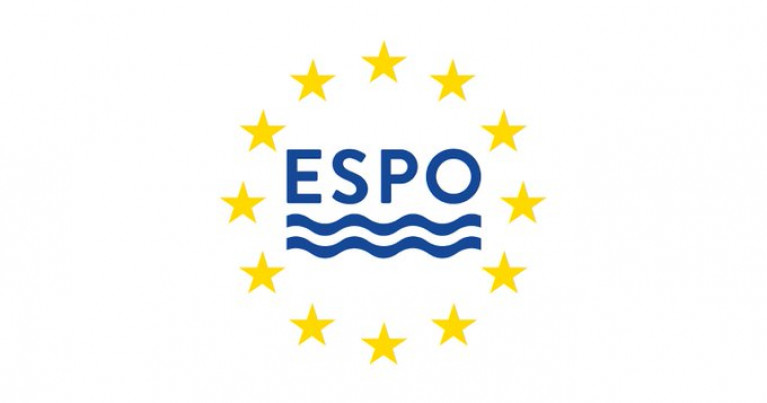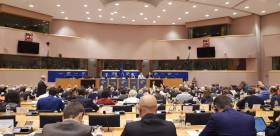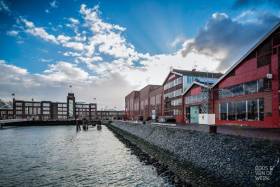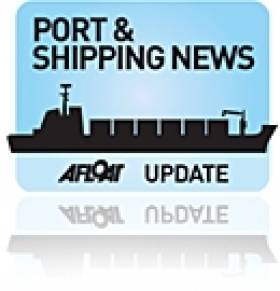Displaying items by tag: EU Parliament
The European Sea Ports Organisation (ESPO) urges the European Parliament and Council to fully align the maritime pillar of the proposal for an Alternative Fuel Infrastructure Regulation (AFIR) with the FuelEU Maritime proposal.
While the discussions on the AFIR proposal are progressing fast in the Intermodal Working Party of the Council with compromise proposals already being in the making, the Fuel EU maritime proposal is only in a very preliminary stage of discussions in the Shipping Working Party.
For Europe’s ports it is essential that these proposals are discussed together and are fully aligned. If not, the whole aim of this exercise, namely a coordinated approach to match demand and supply for alternative fuels and technologies for shipping, is undermined.
“We understand the sense of urgency for the Fit for 55-package, but this must not endanger the careful matching of requirements on ports to deploy onshore power supply with the requirements on the use of these installations as foreseen in the FuelEU Maritime proposal. It is not possible to deploy the required infrastructure without any guarantees that it will be used by ships at berth. These two proposals must mirror each other to truly solve the chicken and egg discussions. An agreement on AFIR cannot be made without considering what will be discussed and agreed in Fuel EU,” says ESPO’s Secretary General Isabelle Ryckbost.
In particular, ESPO asks for a full alignment of Article 9 of the AFIR proposal with Articles 4 and 5, as well as Annex III of the FuelEU Maritime proposal.
The same degree of coordination between the two files must take place in the European Parliament, where the rapporteurs on the different files have just been appointed.
“We understand that different proposals of the Fit for 55-package will be discussed under the Joint Committee procedure. We welcome such a coordinated approach between different EP committees, but believe that coordination between the different specific proposals, in particular the AFIR and FuelEU, is equally important. We do hope that the different rapporteurs and shadows on these proposals are working together to reach a coherent package which delivers the emissions reductions needed,” adds Isabelle Ryckbost.
On 14 July the Commission issued a proposal for an Alternative Fuel Infrastructure Regulation (reviewing the current Directive of 2014) together with a new proposal regulating the use of alternative clean fuels and onshore power supply by shipping, the so-called Fuel EU maritime proposal as part of the Fit for 55-package. By introducing specific rules to mandate the use of OPS or other equivalent technologies, the Commission recognised the importance of a coordinated approach to match supply and demand by introducing a tool that establishes increased levels of demand of renewable and low-carbon maritime fuels and technologies.
ESPO looks forward to discussing the Fit for 55-proposals with the Commission, European Parliament and Council, and to working together with the relevant EU policy makers to deliver an ambitious and coherent Fit for 55-package that is fit for purpose.
European Parliament's Report on TEN-T Guidelines ESPO Welcomes
The European Parliament has adopted the report on the revision of the Trans-European Transport Network (TEN-T) guidelines (2019/2192(INI)) with a large majority.
With the adoption of the own-initiative report last week, the Parliament set out its position on the upcoming revision of the TEN-T guidelines which is planned for the second half of 2021.
The European Sea Ports Organisation (ESPO) welcomes the final report by rapporteur Jens Gieseke (German, EPP).
ESPO especially welcomes that the strategic role of European maritime ports has been recognised by many members of the responsible Transport Committee during the compromise negotiations. The report further underlines the need for sufficient EU funding to complete the TEN-T network, regretting the recent cuts to the Connecting Europe Facility, decided by the Council.
The report properly reflects the complex nature of European maritime ports by stressing that ports are not only a component of maritime transport, but increasingly clusters of all modes of transport, energy, industry and blue economy, by highlighting the cross-border dimension of maritime ports and by recognising the necessity to increase synergies within ports between transport, energy and digital infrastructure.
In the framework of modal shift, ESPO fully supports the recognised importance of Motorways of the Sea (MoS) and short-sea shipping (SSS) as a sustainable mode of transport. The call for a simplification of the MoS requirements in order to create a level playing field with the land-based modes is an important step.
In preparation of the legislative proposal, the European Commission will launch a stakeholder consultation on the impact assessment in the coming weeks. The European Sea Ports Organisation is looking forward to actively contributing to the revision of the TEN-T network to better reflect the importance of a strong, integrated maritime dimension. The Commission proposal reviewing the 2013 Guidelines is due to come out in September 2021.
EU Parliament Transport Committee’s Report Reflects ESPO’s View of Forthcoming TEN-T Review
European Sea Ports Organisation (ESPO) has welcomed the European Parliament’s own-initiative report on the revision of the Trans-European Transport Network (TEN-T) guidelines by rapporteur Jens Gieseke (German, EPP), which was adopted yesterday, 1st December.
“I would like to congratulate the rapporteur and the Transport MEPs for the work on this important own-initiative report. The report very well caters to the points to be addressed in the review. We are happy to see that the strategic and complex role of seaports is well recognised, that the need to level the playing field between Motorways of the Sea and other land-based modes in the setting of requirements is addressed and that the need for synergies between the TEN-T and TEN-E policy is put forward. Finally, we appreciate the paragraphs campaigning for sufficient funding to complete Europe’s Transport Infrastructure Network. One should consider an efficient, sustainable and resilient Transport Infrastructure Network as an important enabler of Europe’s Recovery Strategy. We do hope this report will be taken into account for the preparation of the new TEN-T proposal”, comments ESPO’s Secretary General Isabelle Ryckbost.
ESPO especially welcomes that the strategic role of European maritime ports has been recognised by many members of the Committee during the compromise negotiations and is well reflected in the final voting result. The report further underlines the need for sufficient EU funding to complete the TEN-T network, regretting the recent cuts to the Connecting Europe Facility, decided by the Council.
In the framework of modal shift, as one of the tools to decrease emissions from the transport sector, ESPO especially values that the report underlines the importance of Motorways of the Sea (MoS) and short-sea shipping (SSS) as a sustainable mode of transport. The call for a simplification of the MoS requirements in order to create a level playing field with the land-based modes is fully in line with ESPO’s position on the TEN-T revision.
The report properly reflects the complex nature of European maritime ports by stressing that ports are not only a component of maritime transport, but increasingly clusters of all modes of transport, energy, industry and blue economy, by highlighting the cross-border dimension of maritime ports and by recognising the necessity to increase synergies within ports between transport, energy and digital infrastructure.
ESPO also welcomes that the Transport Committee recognises the continued importance of capacity-ensuring measures to remain competitive transport nodes. Despite the diversity of European ports’ investment needs, investments in basic infrastructure and maritime access infrastructure make up a large share of the planned projects (click HERE).
Moreover, ESPO supports the promotion of better connectivity with third countries, including transport connections to candidate countries, the Western Balkan, as well as countries of the Southern Mediterranean and Eastern Partnership. In light of the withdrawal of the UK from the Union, the report rightly stresses the effective connection of Ireland with mainland Europe with particular attention for the maritime routes as crucial.
ESPO hopes that the report will be largely supported in the plenary vote and will serve as an important input to the European Commission in the preparation of the legislative proposal for the revision of the TEN-T guidelines.
EPSO Welcome European Parliament Transport Committee Result on Connecting Europe Facility II
#Ports&Shipping- At the European Parliament's Committee on Transport and Tourism and the Industry Committee jointly yesterday adopted the Marinescu- Telička- Virrkkunen report on the Connecting Europe Facility proposal 2021-2027.
The European Sea Ports Organisation (ESPO) welcomes the demand for an increased budget for transport. Members of the committees voted to raise the general envelope of the CEF transport budget by €7bn to €33.51bn (in constant prices). The significant role of transport for the development of the Union had been equally recognised by the Parliament’s request for a higher CEF transport budget during the vote on the next MFF.
ESPO particularly appreciates the recognition of the cross-border potential of port projects. Port projects, which are carried out in one Member State, can nevertheless have a substantial cross-border impact, by enhancing connectivity on the sea side, or in the hinterland beyond the borders of a single Member State.
For the first time, the Commission proposed to include an envelope for military mobility in the transport budget. With their vote the Committees have strengthened the civilian priority of dual-use projects eligible under this priority, which addresses one of ESPO's main concerns. ESPO welcomes the broadening of the scope from the exclusive focus on enabling the movement of military troops and equipment, to also cover investments in cyber security resilience and for security and civil protection purposes.
ESPO Secretary-General Isabelle Ryckbost said: "We would like to congratulate the Transport Committee and thank in particular the rapporteurs for achieving a compromise that clearly strengthens the Commission proposal in terms of budget but also in terms of priorities. The Parliament clearly recognizes the importance of strengthening the cross-border connectivity not only on the land side but also on the maritime side. We hope a solution can be found with the Council, which gives the necessary importance to Motorways of the Sea. In the last 3 years only 4 % of the budget was spent on port projects, whereas 95% of world trade goes over sea and 70% of rail freight is coming from the ports."
ESPO remains concerned about the priorities listed in the Annex. Both, Motorways of the Sea (MoS) as a horizontal priority, as well as all maritime and port projects, which are included in the current CEF priorities, have been deleted from the listed priorities.
ESPO considers the maritime dimension of the TEN-T network, and ports as the strategic links between waterborne and land-based transport, as fundamentally important for the connectivity within Europe and with third countries. This importance should be better reflected by the Connecting Europe Facility 2021-2027.
The vote of the European Parliament has been scheduled for the December plenary. The negotiations between Council and Parliament are expected to start early 2019.
ESPO Calls on EU Parliament & Member States to Support Transport Budget Proposal Under New CEF
#Ports&Shipping- The European Commission proposal for the Multi Annual Financial Framework 2021-2027 adopted on Wednesday, reserves a similar budget for the Connecting Europe Facility, the financial instrument for Transport, in the current financial period.
The proposal foresees 12,8 billion EUR under the general envelope, 11,3 billion EUR for transport projects in Cohesion countries and a new envelope of 6,5 billion EUR for investments in transport infrastructure for dual civilian-military use.
For the European Sea Ports Organisation (ESPO), the allocation within the MFF proposal clearly shows the support of CEF as a financial instrument and proves that the Commission, and in particular the Budget Commissioner Günther Oettinger, is recognising the high added value of transport investments in terms of growth, jobs and sustainability.
"We certainly welcome the Commission proposal, but we know that there is still a long way to go. Both the Parliament and Council will have to support this proposal, we cannot allow further cuts. We must now convince the MEPS and the Member States that the CEF Transport budget is serving all sectors and all policies, not only the transport sector as such. We should also convey the message that this budget serves to realise the TEN-T network, an already well identified plan with concrete priorities,” says Isabelle Ryckbost, ESPO’s Secretary General.
While the MFF budget proposal is received positively, European ports believe a lot will nevertheless depend on the concrete layout of the new Connecting Europe Facility proposal due to come out on 6th June. It also remains to be seen how the new military component, which receives a substantial part of the CEF transport budget, will serve the actual investment needs of ports.
“If Europe wants to achieve a fully-fledged and operational TEN-T network, more attention must be given to ports. European ports play an increasingly important role in the transport chain and for the European economy, as they have developed into important nodes of energy, industry and blue economy in addition to their traditional maritime transport role. They can also play an important role in the decarbonisation of the European economy. It is time for Europe to recognise the strategic role of ports and to support their investments accordingly,” adds Isabelle Ryckbost.
A study, commissioned by the European Sea Ports Organisation investigating the future investment needs of European ports, estimates that European ports face investment needs of around 48 € billion for the period 2018-2027. It also shows that port authorities have only been able to obtain 4 percent of the grant envelope over the last four years.
ESPO is looking forward to discuss the European budget and the forthcoming CEF proposal with the responsible DG MOVE Director Herald Ruijters, the European Parliament and the TEN-T Coordinators at its upcoming Conference in Rotterdam, on 31 May and 1 June.
For information about the conference can be found on www.espo-conference.com
Agreement of European Parliament On Monitoring CO2 Emissions from Ships
#CO2emmissions – An agreement between the Permanent Representatives Committee has been confirmed with the European Parliament on new EU-wide rules for monitoring, reporting and verification of CO2 emissions from ships. The agreement reached last month was through an informal trilogue.
International maritime shipping is the only means of transportation not included in the EU's commitment to reduce greenhouse gas emissions. Monitoring of CO2 emissions from ships is the first step of a staged approach to reduce greenhouse gas emissions in this sector as well.
The new regulation will improve information about CO2 emissions relating to the consumption of fuels, transport work and energy efficiency of ships, which make it possible to analyse emission trends and assess ships' performances.
For further information click PDF document here.



























